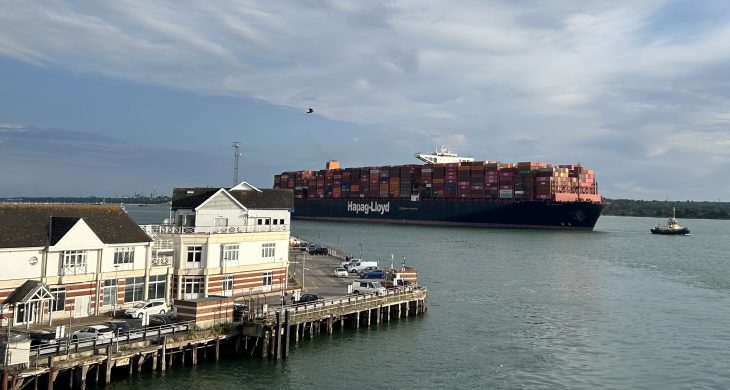Southampton Port City Forum

Prof William Powrie, Prof AbuBakr Bahaj, Dr Toby Roberts & Jenny Knight
The Port City Forum on 2 July was successful in bringing together representatives from various key organisations within the City of Southampton, including Southampton City Council, the University of Southampton, Solent Forum, Maritime UK, Solent Stevedores, ABP, DP World, Ramboll, Carnival UK, Southampton Voluntary Services and Old Town Community Forum. There was a general alignment of high-level strategic aims for the City, and considerable enthusiasm for progressing jointly some projects that could help to achieve these aims.
The event started with a welcome from Prof William Powrie introducing the iPACT network aims. Dr Toby Roberts revealed the trends from the pre-workshop survey and initial feelings about the success level of collaborative working in the city and introducing the key themes of People, Place, Environment and Mobility.

Dr Toby Roberts revealed the trends from the pre-workshop survey and initial feelings about the success level of collaborative working in the city and introducing the key themes of People, Place, Environment and Mobility.

Then followed short presentations from
- Tom Dynes – Associated British Ports,
- Pete Boustred – Southampton City Council,
- Rebecca Kinge – Southampton Voluntary Services,
- Prof AbuBakr Bahaj – University of Southampton
The key theme from these talks was that the city and Port of Southampton are a maritime gateway to the world offering opportunities as well as challenges for the city and the people that live here. We should appreciate and utilise the city centre green space and embrace Southampton as a “National park city” as access to nature is important to improve people’s health and well-being. We should also highlight the heritage of this port city and it’s importance as an ancient and modern city. There is a need to work better together across the Solent region: including Portsmouth, Fareham and the Isle of Wight to secure government funding for green schemes and business investment for good quality jobs to match the expertise in the area.

Challenges include:
- Port logistics and use of waterfront for cruise and container ships
- Congestion on key roads
- Security in the port
- Pollution and air quality
- Lack of public access to the waterfront
- Need for green energy and transport
- Lack of local employment to retain university graduates
- Need for better tourism offers in the city
Biodiversity net-gain regulations offer the opportunity to work with developers to create liveable city space, protect and improve current green & blue spaces. Southampton should be a destination city and offer better tourism and leisure for visitors, making the most of the heritage, arts and nature alongside retail and hospitality offerings. There are planned opportunities to reconnect Southampton with the waterfront, linked to proposed major developments including (i) relocation of some port activities (ii) new flood defences along the Itchen; (iii) relocation of West Quay Road, (iv) Maritime Gateway multi-use development.
Delegates spent time in working groups developing ideas for future projects and collaborations in themes of People, Place, Environment and Mobility.

Future Project ideas included
Joining up and evaluating success: review past and existing work by local groups in Southampton and previous city projects as suggested during the forum by speaking with the forum members
Reconnecting with the waterfront: A Part 4 Engineering student Group Design Project on this for next academic year (2024-5)
Multi-purpose infrastructure
Vision for the port of the future: electric, automated, efficient, optimised, resilient, energy independent
